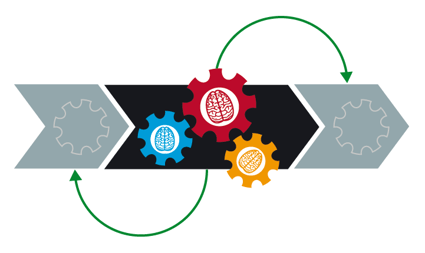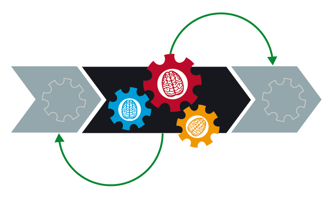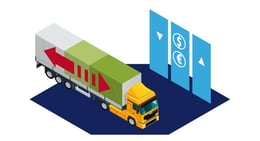Should Your ERP Live in the Cloud?
Brian Hoey - March 24, 2020

 Studies show that, as of 2018, 73% of companies had at least one application in the cloud. This includes the 47% of companies who are using on-premise servers to handle their ERP, but using APIs to connect to the cloud elsewhere. And it’s not hard to imagine why companies are gravitating away from on-premise and towards more flexible cloud-based options—after all, the upfront costs are lower and the risk of obsolescence or costly maintenance is greatly reduced. Even if you’re still hosting critical functions like your ERP in-house, there are still benefits to be gained from cloud-connectivity in terms of flexibility, analytics integration, and visibility.
Studies show that, as of 2018, 73% of companies had at least one application in the cloud. This includes the 47% of companies who are using on-premise servers to handle their ERP, but using APIs to connect to the cloud elsewhere. And it’s not hard to imagine why companies are gravitating away from on-premise and towards more flexible cloud-based options—after all, the upfront costs are lower and the risk of obsolescence or costly maintenance is greatly reduced. Even if you’re still hosting critical functions like your ERP in-house, there are still benefits to be gained from cloud-connectivity in terms of flexibility, analytics integration, and visibility.
Of course, when it comes to making the big decision—whether or not to switch fully to the cloud—there are any number of minute considerations that need to get made: Will the cloud impact compliance? How will you create the right access control framework? What are your most pressing supply chain needs? How are you calculating total cost of ownership (TCO)? All of these questions can give you a starting point in answering the increasingly-pressing question: would your supply chain benefit from cloud-based ERP?
Pitfalls in Modern ERP Usage
To figure out the particular pros and cons of cloud-managed ERP for your unique supply chain, it’s important to consider the current state of your ERP. For many businesses, the biggest ERP-related pitfall that they face is increased rigidity. You hear over and over again about massive ERP-failures across a variety of distinct supply chains, and the issue is almost always that employees couldn’t access the functionality necessary for doing their jobs, leading to Shadow IT, decision-making silos, and, ultimately, huge disruptions. For manufacturers, this might take the form of an ERP system that’s meant to be all-encompassing, but doesn’t offer live inventory tracking (or integration with third party software that does). As a result, inventory planners don’t use the ERP as intended, and planners at other touchpoints on the value chain are constantly working with outdated information.
This doesn’t always result in an immediate disaster, but in a high-leverage situation (say, a critical demand spike for a particular product) it’s easy to imagine how a lack of visibility into something as basic as inventory management could lead to delays, unfulfilled orders, and lost revenue. Generally speaking, the surest safeguard against this kind of disruption is to adopt a Postmodern ERP mindset—i.e. an operational approach where different technologies can be networked together around an ERP system that is centralized but not all-encompassing. No one piece of technology can support the entire range of supply chain functions; as such, planners in different functional silos need to be able to adopt the right tools for their particular jobs without creating unsanctioned, un-integrated Shadow IT. Postmodern ERP is all about doing precisely that.
Can the Cloud Power Postmodern ERP?
Okay, so the ideal ERP strategy requires flexible integration with other technology, in order to promote visibility throughout the end-to-end supply chain planning and execution process. Does the cloud empower you to make that level of flexibility a reality? It certainly can. To begin with, most cloud-based ERP solutions are designed to be more accessible than their on-premise counterparts—this starts with things like offering remote and mobile access to supply chain data and planning modules. If you’re looking into potential backhaul opportunities while moving stock into and out of your warehouses, for example, the ability to access and update information not just from the control tower but also from the warehouse itself is going to make it much easier for you to make use of the data that’s there and keep the data up-to-date.
By the same token, the cloud is also designed to make integration with other technology possible. While your in-house server setup might be configured in such a way as to make it hard to make changes or additions, your cloud provider should be offering an architecture that plays nicely with other software providers. This means that if your transport planning team needs to use a specific app designed to monitor and analyze the signals from RFID chips in cargo shipments, cloud-based ERP solutions ought, in general, to be able to integrate that information fairly seamlessly into other workflows. Not only does this prevent silos, it helps stave off exactly the kinds of disruptions we were discussing in the section above. Thus, for users who might be partially transitioning to the cloud anyway, it’s worth considering the possibility that cloud-hosted ERP systems can pave the way for agile, decentralized supply chain management.
The Industry 4.0 Cloud
Now, some of you reading this probably saw the phrase “decentralized supply chain management” above and immediately thought of Industry 4.0. That’s no coincidence. Though there are any number of considerations that need to get made before you make the jump to cloud-hosted ERP, it’s worth thinking about the link between Industry 4.0 and the cloud. For a good while now, prognosticators have been suggesting that cloud-based technology will empower the kinds of advanced analytics and generally smart, responsive supply chain planning that Industry 4.0 is all about. On some level, this stands to reason: Industry 4.0 is founded upon collecting, storing, and analyzing digital supply chain data more effectively, and we’ve shown above how the cloud can do that.
As with any new technology, it’s possible to overhype the powers of the cloud. For larger enterprises that won’t bat an eye at the expense that maintaining in-house servers presents in terms of both maintenance and upfront cost, the added control and potentially lower total cost of ownership (TCO) could still seem attractive. For companies that are actively working towards Industry 4.0, however, these benefits can be outweighed by the simple fact that the cloud is designed to be future-proof. This means that as new technological developments come to light—whether that’s improved autonomous machine decision or new cyber-physical systems—you’ll be able to adapt to and integrate with them at the drop of a hat. In this way, ERP systems can be ideal use cases for cloud adoption.
LATEST POSTS
- Understand Why Production Planning Needs Specialized Solutions
- Understand Circular Economy in The Manufacturing Industry
- How Can Industry 4.0 IT Integration Be Achieved Smoothly?
- The Significance of Order Sequencing in Discrete Manufacturing
- How to improve your Supply Chain Management: The Power of Control Towers



